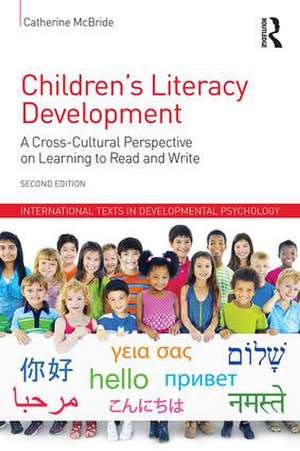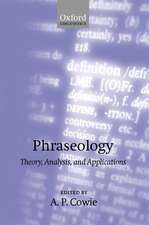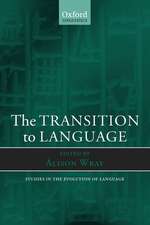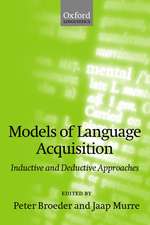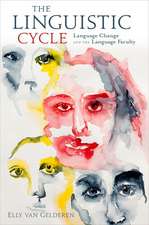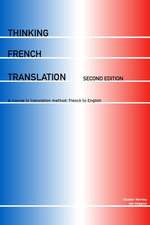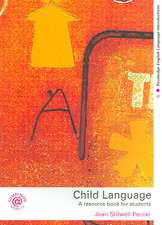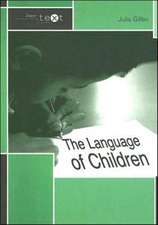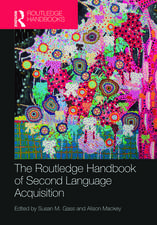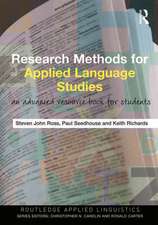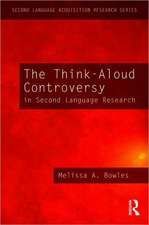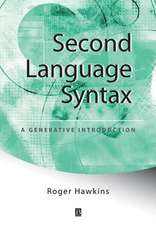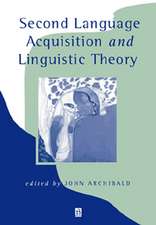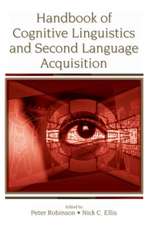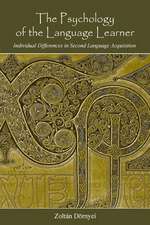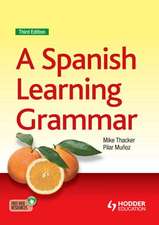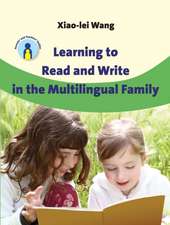Children's Literacy Development: A Cross-Cultural Perspective on Learning to Read and Write: International Texts in Developmental Psychology
Autor Catherine McBrideen Limba Engleză Paperback – 30 noi 2015
- The importance of phonological sensitivity for learning to read and to write
- The first units, or building blocks, of literacy learning in different scripts such as Chinese, English, Korean Hangul, Hebrew, Hindi and Arabic
- The role of visual processing in reading and writing skills
- How the latest research can inform the teaching of reading
- An overview of our understanding of dyslexia, including recent neuroscientific research
- The developmental challenges in becoming biliterate
- What is special about writing for beginners and later for comprehensive writing
- Basics of reading comprehension
| Toate formatele și edițiile | Preț | Express |
|---|---|---|
| Paperback (1) | 444.36 lei 6-8 săpt. | |
| Taylor & Francis – 30 noi 2015 | 444.36 lei 6-8 săpt. | |
| Hardback (1) | 1001.87 lei 6-8 săpt. | |
| Taylor & Francis – 7 dec 2015 | 1001.87 lei 6-8 săpt. |
Preț: 444.36 lei
Preț vechi: 522.77 lei
-15% Nou
Puncte Express: 667
Preț estimativ în valută:
85.04€ • 88.45$ • 70.20£
85.04€ • 88.45$ • 70.20£
Carte tipărită la comandă
Livrare economică 15-29 aprilie
Preluare comenzi: 021 569.72.76
Specificații
ISBN-13: 9781848722873
ISBN-10: 1848722877
Pagini: 250
Ilustrații: 6 black & white tables, 21 black & white line drawings
Dimensiuni: 156 x 234 x 15 mm
Greutate: 0.46 kg
Ediția:Revised
Editura: Taylor & Francis
Colecția Routledge
Seria International Texts in Developmental Psychology
Locul publicării:Oxford, United Kingdom
ISBN-10: 1848722877
Pagini: 250
Ilustrații: 6 black & white tables, 21 black & white line drawings
Dimensiuni: 156 x 234 x 15 mm
Greutate: 0.46 kg
Ediția:Revised
Editura: Taylor & Francis
Colecția Routledge
Seria International Texts in Developmental Psychology
Locul publicării:Oxford, United Kingdom
Public țintă
Postgraduate, Professional, and UndergraduateCuprins
1. An ecological approach to reading development 2. The development of phonological processing and language for reading 3. Building blocks of reading 4. The role of morphological awareness in learning to read 5. Visual and orthographic skills in reading and writing 6. Writing: Spelling and higher-order processes 7. Approaches to teaching reading 8. Dyslexia 9. Bilingualism and literacy 10. Reading comprehension
Recenzii
"In this excellent book, McBride describes children’s literacy development literally ‘from the outside in’. By leading the reader on a journey from cultural context through the important role of home environment, she convinces us of the need to differentiate the language-universal and language-specific skills required for literacy to flourish." – Maggie Snowling, University of Oxford, UK
"This is a brilliantly executed cross-cultural discussion of emergent literacy that is aptly suitable for international readership. The most distinctive feature of the book is the proper balance that the author manages to strike between the cognitive-linguistic and the environmental-sociocultural factors that shape the acquisition of literacy in different languages and different contexts. Utilizing research insights gained from a wide range of languages, the author impressively succeeds in highlighting the theme that literacy acquisition is sensitive to the language, the orthography, and the sociocultural milieu within which this process is embedded and, therefore, that understanding the complex unfolding of literacy requires an understanding of the host of influences that this process naturally responds to. The cross-cultural perspective of the book makes it aptly appropriate for researchers and research students engaged in the study of literacy in all languages. The clearly articulated evidence-based arguments and the elegantly presented well-referenced chapters make the book a useful resource for foundational and graduate courses in numerous disciplines including psychology, literacy, psycholinguistics, and education." – Elinor Saiegh-Haddad, Bar-Ilan University, Israel
"With a door, we can go out; with a window, we can choose not to go out." (Qian Zhongshu, 1941). This book is a window through which you can learn the best knowledge about literacy development (and impairment) around the world - cross culture, language, and orthography. If you have no time digging the vast research on this topic by yourself, this is the book that offers you the best panoramic view." – Li Yin, Tsinghua University, Beijing, China
"In Children’s Literacy Development, Catherine McBride has provided a fascinating and well-written account of the development of literacy in different languages. She skillfully explores the context of literacy learning in different cultures. The discussion is enriched by her knowledge of many orthographies and her ability to synthesize information from many sources." – Linda Siegel, The University of British Columbia, Canada
"Offering a wealth of researched based insight, this new edition of "Children's Literacy Development" provides invaluable information fundamental to a coherent understanding of literacy around the world. Indeed, "Children's Literacy Development" is the only major work available that provides an overview of how children learn to read and write in different languages, and will be essential reading for all students of Developmental Psychology, Educational Psychology, Psycholinguistics and Speech Therapy. Enhanced with the inclusion of a thirty-eight page bibliographic listing of References, and a twenty-four page Index, "Children's Literacy Development" is an outstanding work of sound scholarship." - James A. Cox, Midwest Book Review
"In this excellent book, McBride describes children’s literacy development literally ‘from the outside in’. By leading the reader on a journey from cultural context through the important role of home environment, she convinces us of the need to differentiate the language-universal and language-specific skills required for literacy to flourish." – Maggie Snowling, University of Oxford, UK
"In Children’s Literacy Development, Catherine McBride has provided a fascinating and well-written account of the development of literacy in different languages. She skillfully explores the context of literacy learning in different cultures. The discussion is enriched by her knowledge of many orthographies and her ability to synthesize information from many sources." – Linda Siegel, The University of British Columbia, Canada
"This is a brilliantly executed cross-cultural discussion of emergent literacy that is aptly suitable for international readership. Utilizing research insights gained from a wide range of languages, the author impressively succeeds in highlighting the theme that literacy acquisition is sensitive to the language, the orthography, and the sociocultural milieu within which this process is embedded." – Elinor Saiegh-Haddad, Bar-Ilan University, Israel
"This book provides a window through which one can view the major landmarks in the study of literacy development (and impairment) around the world - cross culture, language, and orthography. If you have no time to explore this vast area of research by yourself, this is the book that offers the best panoramic view." – Li Yin, Tsinghua University, Beijing, China
"This is a brilliantly executed cross-cultural discussion of emergent literacy that is aptly suitable for international readership. The most distinctive feature of the book is the proper balance that the author manages to strike between the cognitive-linguistic and the environmental-sociocultural factors that shape the acquisition of literacy in different languages and different contexts. Utilizing research insights gained from a wide range of languages, the author impressively succeeds in highlighting the theme that literacy acquisition is sensitive to the language, the orthography, and the sociocultural milieu within which this process is embedded and, therefore, that understanding the complex unfolding of literacy requires an understanding of the host of influences that this process naturally responds to. The cross-cultural perspective of the book makes it aptly appropriate for researchers and research students engaged in the study of literacy in all languages. The clearly articulated evidence-based arguments and the elegantly presented well-referenced chapters make the book a useful resource for foundational and graduate courses in numerous disciplines including psychology, literacy, psycholinguistics, and education." – Elinor Saiegh-Haddad, Bar-Ilan University, Israel
"With a door, we can go out; with a window, we can choose not to go out." (Qian Zhongshu, 1941). This book is a window through which you can learn the best knowledge about literacy development (and impairment) around the world - cross culture, language, and orthography. If you have no time digging the vast research on this topic by yourself, this is the book that offers you the best panoramic view." – Li Yin, Tsinghua University, Beijing, China
"In Children’s Literacy Development, Catherine McBride has provided a fascinating and well-written account of the development of literacy in different languages. She skillfully explores the context of literacy learning in different cultures. The discussion is enriched by her knowledge of many orthographies and her ability to synthesize information from many sources." – Linda Siegel, The University of British Columbia, Canada
"Offering a wealth of researched based insight, this new edition of "Children's Literacy Development" provides invaluable information fundamental to a coherent understanding of literacy around the world. Indeed, "Children's Literacy Development" is the only major work available that provides an overview of how children learn to read and write in different languages, and will be essential reading for all students of Developmental Psychology, Educational Psychology, Psycholinguistics and Speech Therapy. Enhanced with the inclusion of a thirty-eight page bibliographic listing of References, and a twenty-four page Index, "Children's Literacy Development" is an outstanding work of sound scholarship." - James A. Cox, Midwest Book Review
"In this excellent book, McBride describes children’s literacy development literally ‘from the outside in’. By leading the reader on a journey from cultural context through the important role of home environment, she convinces us of the need to differentiate the language-universal and language-specific skills required for literacy to flourish." – Maggie Snowling, University of Oxford, UK
"In Children’s Literacy Development, Catherine McBride has provided a fascinating and well-written account of the development of literacy in different languages. She skillfully explores the context of literacy learning in different cultures. The discussion is enriched by her knowledge of many orthographies and her ability to synthesize information from many sources." – Linda Siegel, The University of British Columbia, Canada
"This is a brilliantly executed cross-cultural discussion of emergent literacy that is aptly suitable for international readership. Utilizing research insights gained from a wide range of languages, the author impressively succeeds in highlighting the theme that literacy acquisition is sensitive to the language, the orthography, and the sociocultural milieu within which this process is embedded." – Elinor Saiegh-Haddad, Bar-Ilan University, Israel
"This book provides a window through which one can view the major landmarks in the study of literacy development (and impairment) around the world - cross culture, language, and orthography. If you have no time to explore this vast area of research by yourself, this is the book that offers the best panoramic view." – Li Yin, Tsinghua University, Beijing, China
Descriere
In the thoroughly updated second edition of this unique book, Catherine McBride examines how the languages we know help structure the process of becoming literate. Taking an ecological and distinctively cross-cultural perspective, the book looks at reading and writing development and impairment across a range of languages, scripts, and contexts. The book covers issues including:
- The importance of phonological sensitivity for learning to read and to write
- The first units, or building blocks, of literacy learning in different scripts such as Chinese, English, Korean Hangul, Hebrew, Hindi and Arabic
- The role of visual processing in reading and writing skills
- How the latest research can inform the teaching of reading
- An overview of our understanding of dyslexia, including recent neuroscientific research
- The developmental challenges in becoming biliterate
- What is special about writing for beginners and later for comprehensive writing
- Basics of reading comprehension
